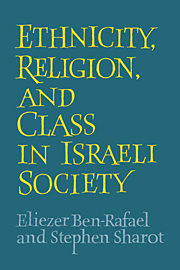Book contents
- Frontmatter
- Contents
- Acknowledgments
- I Theoretical and empirical background
- II Social patterns and behavior
- 5 Neighborhoods: synagogues and neighborhood committees
- 6 Religiosity and secularization
- 7 Friendship networks
- III Identities and images
- IV The impact of stratification
- V Social cleavages: an overview of Israeli society and some theoretical implications
- Appendix A The sample
- Appendix B Deprivation index
- Appendix C Indexes of ethnic identification
- Glossary
- Notes
- References
- Index
7 - Friendship networks
Published online by Cambridge University Press: 12 September 2009
- Frontmatter
- Contents
- Acknowledgments
- I Theoretical and empirical background
- II Social patterns and behavior
- 5 Neighborhoods: synagogues and neighborhood committees
- 6 Religiosity and secularization
- 7 Friendship networks
- III Identities and images
- IV The impact of stratification
- V Social cleavages: an overview of Israeli society and some theoretical implications
- Appendix A The sample
- Appendix B Deprivation index
- Appendix C Indexes of ethnic identification
- Glossary
- Notes
- References
- Index
Summary
Friendships: theoretical models
In his well-known delineation of the dimensions of assimilation, Milton Gordon noted that structural assimilation was “the keystone of the arch of assimilation.” A minority's interaction with the majority at the primary group level was bound to be accompanied or followed by its assimilation in other dimensions (cultural, marital, identificational, etc.), and this would lead to its disappearance as a separate entity (Gordon, 1964:80–1). Recent studies of ethnicity have tended to move away from the implicit one-directional emphasis of assimilation and have reconceptualized interethnic relations in terms of boundaries, but the importance of extensive interethnic friendships and intermarriage in the weakening or dissolution of ethnic groups has been reiterated.
Intermarriage is a clear indicator of a change in ethnic boundaries, and in the United States the increase and extensiveness of intermarriage among most white ethnic groups probably signals the “twilight of their ethnicity” (Alba, 1985). In Israel, a large proportion of marriages now cuts across countries of origin, but the proportion that crosses the broad European and Middle Eastern categories has increased only marginally in recent years. The Moroccan respondents in our sample had the highest proportion of in-marriage: 71% were married to spouses of Moroccan origin, and only 8% were married to spouses of European origin.
- Type
- Chapter
- Information
- Ethnicity, Religion and Class in Israeli Society , pp. 101 - 116Publisher: Cambridge University PressPrint publication year: 1991



